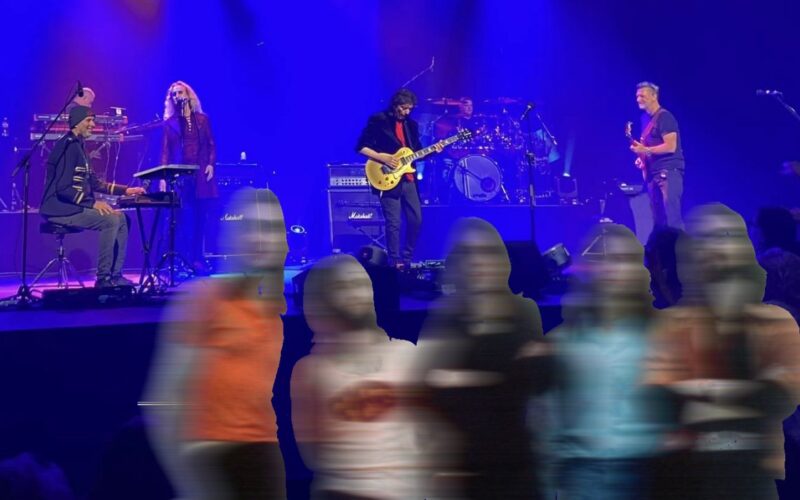
As the 1970s came to a close, the few progressive rock bands who became popular were still selling out arenas, but the winds of change were about to blow the rock ‘n’ roll landscape in a new direction. Genesis was at the top echelon of prog when a major personnel shift affected their approach to songwriting.
As guitarist Steve Hackett detailed in his biography A Genesis in My Bed, toward the end of that decade he found that the musical ideas he offered to his bandmates were increasingly rejected, fueling his desire to follow his own musical path. Hackett would have been fine creating solo albums while remaining a member of a band that produced some of the greatest releases in the prog canon. Above all, he greatly valued that collaboration and wanted it to continue. Unfortunately, after a minor flareup with bassist Mike Rutherford, he and keyboardist Tony Banks gave Hackett what amounted to an ultimatum: No more solo projects if he were to remain a member of Genesis.
Hackett hoped that this was just a temporary skirmish that would pass. After all, drummer and now lead singer Phil Collins didn’t seem to face an issue with his jazz ensemble Brand X, and Rutherford had even contributed to and had been supportive of Hackett’s first album, Voyage of the Acolyte. However, during the mixing sessions for the live album Seconds Out, Hackett came to the realization that he needed to pursue his own creative passions, and regardless it was time to strike out on his own.
Fast forward to 2022, and Genesis embarked on what was essentially their farewell tour. The personnel and set list were focused on the pop version of the band: most of what was performed from their progressive period – when Hackett was present, with and without founding member Peter Gabriel – mainly consisted of only portions of songs from anything before … And Then There Were Three …, their first album as a trio.
When Genesis moved away from prog, there’s no denying they became more successful with mainstream audiences. But it came at a cost to dedicated fans who supported the adventurous musical landscapes Genesis created that first brought them fame and fortune. They were embraced by a new generation of consumers who essentially became aware of Genesis due to a solo album: Phil Collins’ About Face, which opened the door to more commercial hits from the core trio. It was almost difficult to discern where solo Collins ended and pop Genesis began.
To the MTV generation, this was what Genesis was about. If those viewers’ only knowledge of the band consisted of the videos from that era, they may have not known there used to be another lineup who offered an entirely different output – not unlike Yes in the same period for 90125 (“Steve and Rick who…?”).
Banks and Rutherford may have agreed on Genesis’ move way from prog but from the outside looking in the catalyst was Collins, whose “hit” potential had to have been a huge factor. The irony is that back in the early days of Yes, Collins acted as an impromptu roadie. When Bill Bruford – whose passion for jazz fit in with that group’s extended musical flights – left them at one point, Collins desperately wanted to take his place. As fate would have it, Bruford was later recruited to play drums on the Trick of the Tail tour, after Gabriel left the band to become a superstar in his own right, resulting in Collins assuming the role of lead singer.
Accomplished musicianship was not only embraced in the late 1960s, it was practically commonplace, particularly in the English rock music scene. It was there where artists created compositions that included sections that were part jams, partly arranged — and were reviled by purists who demanded that songs be short, with only brief solos relegated to recapitulating verses or choruses.
During this time, I recall reading an interview where Collins maligned the more expansive style of drumming that was key to the prog Genesis created: the term he condescendingly used was “flailing about,” as if it no longer had any value. In a 1997 interview with Modern Drummer (as recapped in Far Out Magazine), Collins mentions that when they were recording “Burning Rope” for that first post-Hackett album, sole songwriter Banks knew the arrangement he wanted to record but Collins’ made him remove parts. He did so based on his own distaste for the type of music he indicated was a relic: “… this song is a period piece. It doesn’t make it in the 20th century. I know there are people who like this music, but I just couldn’t get up on stage and play or sing this kind of material anymore.”
To Collins’ point, for those of us who like – make that love – prog, it’s unfortunate that there is no recording of Banks’ original vision for “Burning Rope” (that we know of, at least). As a dedicated Genesis fan, I bought its parent album, and that was the only track that spoke to me. Banks, while promoting BBC Broadcasts, defended Genesis’ more streamlined approach in an interview with Vulture but revealed his desire to do something a bit more creative. He divulged Collins was lucky that Genesis didn’t record his solo hit “In the Air Tonight” as Banks would have likely thrown in some unconventional chords.
In that same interview, Banks pointed out an incongruity: Guitarist Steve Hackett, who left the band in 1978, is the one member who has been recreating Genesis’ prog masterworks in his solo performances. In 1996, Hackett released Genesis Revisited as a solo studio album with the goals of reinterpreting the tracks he had created with Genesis as well as correcting anything that he wasn’t satisfied with on the original sessions. The album featured many guest artists including John Wetton, Bill Bruford, and Tony Levin to name a very few.
Originally Hackett would deviate from the original Genesis versions as he had the creative freedom to reimagine them. One example of this was his arrangement of the popular “Firth of Fifth,” the most obvious change being the center instrumental section that had recapitulated the solo piano introduction. Apparently, that didn’t go over too well with the fans who preferred faithful renditions of the original tunes. While Hackett can be lauded for attempting to do something different, these songs have become so iconic to old-school Genesis fans that he eventually would stay fairly faithful to the originals – and the joy in his performances indicates he is more than happy to do so.
With the pop-based Genesis indicating after that last tour that they were done, could there be a chance that a progressive version of the band might emerge, albeit briefly? Remember that after Jon Anderson became disenchanted with the 90125 version of Yes, he was the facilitator for the classic offshoot band that became Anderson Bruford Wakeman Howe. Could Genesis do the same with Banks Gabriel Hackett Rutherford?
For the Yes offshoot, that was a quarter century ago, and with folks now being much older, a prog Genesis reunion seems a distant long shot. Banks has said he’s not interested in looking back, Rutherford might be content revisiting Genesis’ later output with a reformed Mike and the Mechanics, and Gabriel’s solo success might negate the idea of his participation. (We already know from Collins’ comments that he would not have the strength or inclination to participate.)
Given those members’ feelings and the state of affairs, a prog-era, Genesis reunion appears to be not only doubtful but extremely improbable. That being said, it doesn’t mean it’s impossible. Circumstances might change to where this reunification could miraculously come together. But how would Hackett, who’s been regularly revisiting a great many selections from Genesis’ prog output, feel about a possible reunion with the aforementioned three?
I reached out to Steve Hackett, asking him if the stars aligned would he be open to one or more reunion concerts or a tour with Tony, Mike, and Peter, and how that might impact his own solo band? Given my previous comments about those members, his response wasn’t surprising: “I’d be up for it but I think it is unlikely to happen. … I’m always up for a challenge but it is all very unlikely. I’m really happy to play both my solo and Genesis music with my own band.”
On his most recent tours, Hackett has been presenting Genesis albums in their entirety, including Seconds Out and Foxtrot, the latter for that record’s 40th anniversary. For shows in 2024, Steve will be focusing on selections from The Lamb Lies Down on Broadway. On February 16, he will also be releasing a new studio album called The Circus and The Nightwhale – which, as of this posting, is available for preorder. One would expect his upcoming tour to include selections from that release.
Prog era Genesis fans are lucky that Steve Hackett is keeping that flame alive (tour dates can be found on his website). We can only hope, wish, and pray for a progressive-era Genesis reunion. In the meantime, for the fans who attended those concerts back in the day – and for those who may not even have yet been born – what he is providing is the next best thing.
Special thanks to Steve Hackett and Rick North for their input, and to Bill Bruford for the video from the Bill Bruford YouTube channel.
© 2024 Mike Tiano. All Rights Reserved.
Purchase ‘The Circus and the Nightwhale.’
- The Beatles in Seattle 1964: Internet Archive - May 8, 2024
- Steve McKnight and GayC/DC: Breaking the Rainbow Ceiling - April 22, 2024
- How the Seattle Cinerama Was Reborn as SIFF Cinema Downtown - April 12, 2024




